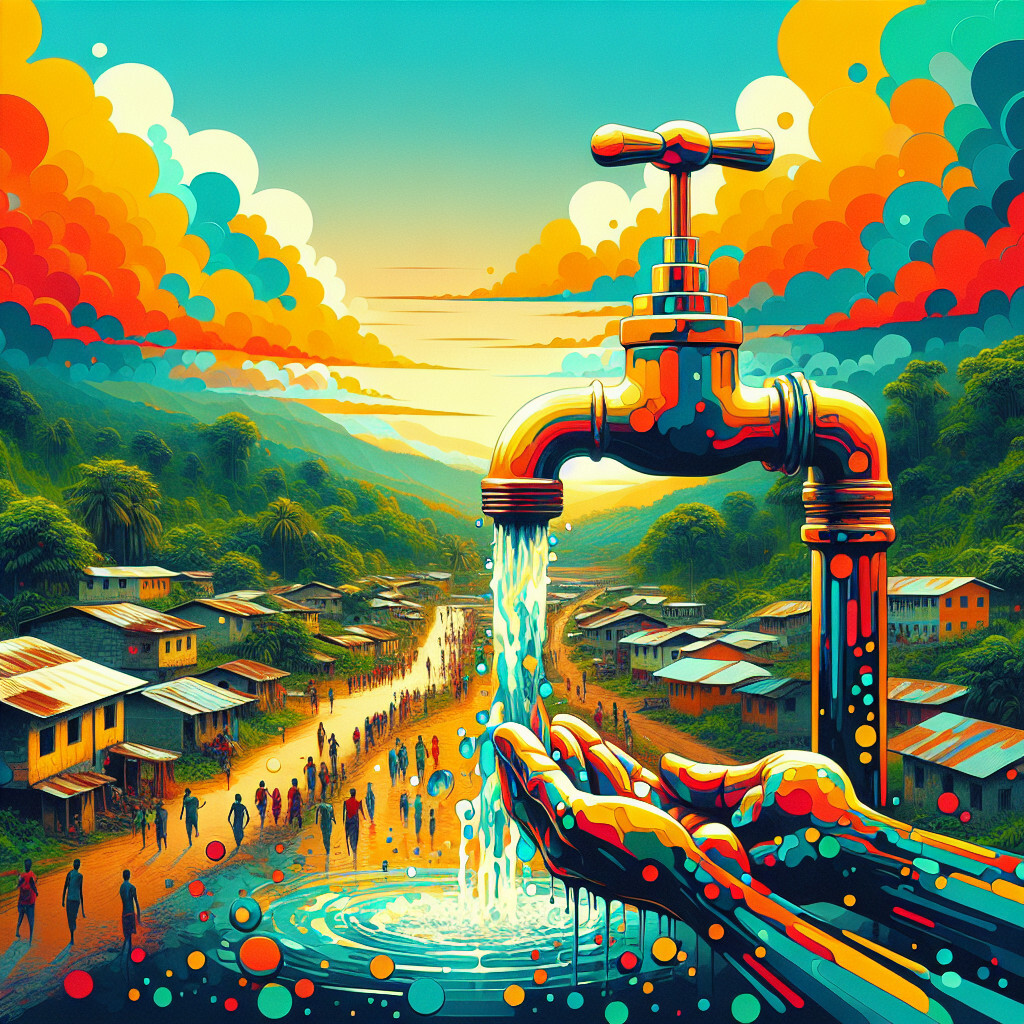-
Table of Contents
“Equatorial Guinea’s Tap Water: A Question of Quality and Accessibility.”
Introduction

Equatorial Guinea, a small country located in Central Africa, has a significant issue with its tap water quality. Despite being one of the richest countries per capita in Africa due to its oil reserves, the majority of the population does not have access to clean drinking water. The tap water is often contaminated with harmful bacteria and parasites, making it unsafe for consumption without proper treatment. Infrastructure for water treatment and sanitation is lacking, particularly in rural areas, leading to widespread waterborne diseases. Therefore, it is generally advised for visitors to avoid drinking tap water in Equatorial Guinea.
Understanding the Quality of Tap Water in Equatorial Guinea
Equatorial Guinea, a small nation on the west coast of Central Africa, is known for its rich biodiversity and vast oil reserves. However, despite its natural wealth, the country grapples with numerous challenges, one of which is the quality of its tap water. Understanding the quality of tap water in Equatorial Guinea is crucial, as it directly impacts the health and well-being of its residents.
The quality of tap water in Equatorial Guinea varies significantly across the country. In urban areas, such as Malabo and Bata, the tap water is generally safe for consumption. This is largely due to the government’s efforts to improve water infrastructure in these areas, which include the construction of water treatment plants and the implementation of stringent water quality standards. Consequently, the tap water in these areas is typically clear, odorless, and free from harmful bacteria and contaminants.
However, the situation is markedly different in rural areas. Here, the tap water is often unsafe for consumption due to inadequate sanitation and a lack of proper water treatment facilities. The water is frequently contaminated with harmful bacteria, parasites, and heavy metals, which can cause a range of health problems, including diarrhea, typhoid, and cholera. Moreover, the water often has a murky appearance and an unpleasant taste, further indicating its poor quality.
The government of Equatorial Guinea has made efforts to address this issue. For instance, it has partnered with international organizations to implement water and sanitation projects in rural areas. These projects aim to improve the quality of tap water by constructing new water treatment facilities, repairing existing ones, and educating residents about the importance of clean water and proper sanitation. Despite these efforts, however, access to safe tap water remains a significant challenge in many rural areas.
Climate change also poses a threat to the quality of tap water in Equatorial Guinea. The country is vulnerable to extreme weather events, such as heavy rainfall and droughts, which can disrupt water supply and contaminate water sources. For instance, heavy rainfall can cause flooding, which can wash contaminants into water sources. On the other hand, droughts can reduce water availability, forcing residents to rely on unsafe water sources.
In conclusion, the quality of tap water in Equatorial Guinea is a complex issue that is influenced by a variety of factors, including geographical location, infrastructure, and climate change. While the tap water in urban areas is generally safe for consumption, the same cannot be said for many rural areas, where access to safe tap water remains a significant challenge. The government, in partnership with international organizations, is making efforts to improve the situation, but there is still a long way to go. As such, it is recommended that visitors and residents, particularly those in rural areas, take precautions to ensure the safety of their drinking water. This could include boiling tap water, using water purification tablets, or drinking bottled water.
The State of Tap Water in Equatorial Guinea: A Comprehensive Analysis
Equatorial Guinea, a small nation on the west coast of Central Africa, is known for its rich biodiversity and vast oil reserves. However, despite its natural wealth, the country grapples with a significant challenge: providing clean, safe tap water to its citizens. This article provides a comprehensive analysis of the state of tap water in Equatorial Guinea, examining the factors that contribute to its quality and the implications for public health.
The quality of tap water in Equatorial Guinea is a matter of grave concern. According to the World Health Organization, only about 50% of the population has access to clean drinking water. This is primarily due to inadequate infrastructure, lack of sanitation, and pollution. The country’s water supply system is often unreliable, with frequent interruptions and low pressure. Moreover, the water that does reach households is often contaminated with bacteria, viruses, and other harmful substances, making it unsafe for consumption.
The situation is particularly dire in rural areas, where access to clean water is even more limited. Many rural communities rely on rivers, streams, and wells for their water supply, which are often contaminated with fecal matter and other pollutants. This lack of access to clean water has serious implications for public health, contributing to the spread of waterborne diseases such as cholera, typhoid, and diarrhea.
The government of Equatorial Guinea has made efforts to improve the country’s water supply system. In recent years, it has invested in the construction of new water treatment plants and the expansion of the water distribution network. However, these efforts have been hampered by a lack of funding and technical expertise, as well as corruption and mismanagement.
Furthermore, climate change poses a significant threat to the country’s water supply. Equatorial Guinea is vulnerable to changes in rainfall patterns, which can lead to droughts and floods. These extreme weather events can damage water infrastructure, disrupt water supply, and increase the risk of waterborne diseases. Therefore, addressing the impacts of climate change is crucial for ensuring the sustainability of the country’s water supply.
Despite these challenges, there are reasons for optimism. International organizations, such as the United Nations and the World Bank, are providing financial and technical assistance to improve the country’s water supply system. These efforts are complemented by initiatives from non-governmental organizations, which are working to provide clean water to rural communities through the construction of wells and rainwater harvesting systems.
Moreover, there is growing recognition of the importance of community participation in water management. By involving local communities in the planning, implementation, and maintenance of water projects, it is possible to ensure that these initiatives are sustainable and responsive to local needs.
In conclusion, the state of tap water in Equatorial Guinea is a complex issue that requires a multifaceted approach. While significant challenges remain, there are promising initiatives underway to improve the country’s water supply system. By investing in infrastructure, strengthening governance, and promoting community participation, it is possible to ensure that all citizens of Equatorial Guinea have access to clean, safe tap water.
Challenges and Improvements: A Look at Equatorial Guinea’s Tap Water
Equatorial Guinea, a small nation on the west coast of Central Africa, has been grappling with the challenge of providing clean, safe tap water to its citizens for many years. Despite being one of Sub-Saharan Africa’s largest oil producers, the country’s water infrastructure has been largely underdeveloped, leading to a significant portion of the population lacking access to potable water. This article aims to shed light on the current state of tap water in Equatorial Guinea, the challenges faced, and the improvements made over the years.
The quality of tap water in Equatorial Guinea has been a subject of concern for a long time. The country’s water supply system is plagued by a myriad of issues, including inadequate infrastructure, poor maintenance, and contamination. The water infrastructure, particularly in rural areas, is often outdated and insufficient to meet the needs of the growing population. This has resulted in many households relying on untreated surface water for their daily needs, exposing them to a host of waterborne diseases.
Moreover, the maintenance of the existing water supply systems has been less than satisfactory. Frequent breakdowns and leakages are common, leading to significant water loss and further exacerbating the water scarcity issue. The water that does reach the taps is often contaminated with harmful bacteria and pollutants due to inadequate treatment and sanitation practices. This has led to a high incidence of water-related illnesses, such as cholera and typhoid, among the population.
However, it’s not all doom and gloom. Over the years, Equatorial Guinea has made significant strides in improving its water supply situation. The government, in collaboration with international organizations, has embarked on several initiatives aimed at enhancing the country’s water infrastructure and ensuring access to clean, safe tap water for all its citizens.
One such initiative is the Integrated National Water Supply and Sanitation Program, launched in 2015. This program aims to increase access to potable water and sanitation services in urban and rural areas through the construction and rehabilitation of water supply systems. It also focuses on capacity building and institutional strengthening to ensure the sustainability of these systems.
Furthermore, the government has been investing heavily in water treatment facilities to improve the quality of tap water. New water treatment plants have been constructed, and existing ones upgraded, to ensure that the water reaching the taps is free from harmful contaminants. The government has also been working on improving sanitation practices to prevent the contamination of water sources.
In addition, efforts have been made to involve the community in the management of water resources. Community-based water management committees have been established to oversee the operation and maintenance of water supply systems at the local level. This has not only helped in ensuring the sustainability of these systems but also in promoting a sense of ownership and responsibility among the community members.
In conclusion, while the tap water situation in Equatorial Guinea is far from ideal, there have been notable improvements over the years. The government’s commitment to improving the water infrastructure and ensuring access to clean, safe tap water is commendable. However, there is still a long way to go. Continued investment in water infrastructure, coupled with effective management and maintenance practices, is crucial to ensure that every citizen of Equatorial Guinea has access to clean, safe tap water.
Health Implications of Tap Water Consumption in Equatorial Guinea
Equatorial Guinea, a small nation on the west coast of Central Africa, is known for its rich biodiversity and vast oil reserves. However, the country’s tap water quality is a subject of concern that often goes unnoticed. The health implications of tap water consumption in Equatorial Guinea are significant and warrant attention.
The quality of tap water in Equatorial Guinea varies greatly, largely due to the country’s geographical diversity and infrastructural challenges. In urban areas, the tap water is generally treated and considered safe for consumption. However, in rural areas, the situation is quite different. The lack of proper sanitation facilities and clean water sources often results in the consumption of contaminated water, leading to various health issues.
The World Health Organization (WHO) states that contaminated water can transmit diseases such as diarrhea, cholera, dysentery, typhoid, and polio. These diseases are primarily caused by the ingestion of water contaminated with fecal matter, which contains harmful bacteria, viruses, and parasites. In Equatorial Guinea, these waterborne diseases are a significant public health concern, particularly in rural areas where access to clean water is limited.
Moreover, the consumption of contaminated tap water can also lead to other health complications. For instance, it can cause anemia due to the presence of heavy metals like lead and mercury. These heavy metals can interfere with the production of red blood cells, leading to anemia. Additionally, long-term exposure to these heavy metals can also lead to kidney damage and impair neurological function.
Furthermore, the presence of harmful chemicals in tap water can also pose serious health risks. In Equatorial Guinea, the oil industry is a major contributor to water pollution. Oil spills and industrial waste often contaminate water sources, leading to the presence of harmful chemicals in tap water. Consumption of such water can lead to various health issues, including skin disorders, hormonal imbalances, and even certain types of cancer.
The government of Equatorial Guinea has made efforts to improve the quality of tap water in the country. Several water treatment plants have been established, and efforts are being made to extend the water distribution network to rural areas. However, these efforts are often hampered by logistical challenges and lack of resources.
In conclusion, the health implications of tap water consumption in Equatorial Guinea are significant. The consumption of contaminated tap water can lead to various diseases and health complications. While efforts are being made to improve the quality of tap water, much work remains to be done. It is crucial for the government and international organizations to work together to address this issue and ensure access to clean and safe drinking water for all residents of Equatorial Guinea. This not only improves the health and wellbeing of the population but also contributes to the overall development and progress of the nation.
Q&A
1. Question: Is the tap water in Equatorial Guinea safe to drink?
Answer: No, the tap water in Equatorial Guinea is generally not considered safe to drink.
2. Question: What are the common issues with tap water in Equatorial Guinea?
Answer: The common issues with tap water in Equatorial Guinea include contamination with bacteria, viruses, and parasites due to inadequate sanitation facilities and infrastructure.
3. Question: How do locals in Equatorial Guinea get their drinking water?
Answer: Locals in Equatorial Guinea often rely on bottled water, boiled water, or water treated with disinfectants for drinking.
4. Question: Are there efforts to improve the tap water quality in Equatorial Guinea?
Answer: Yes, there are ongoing efforts by the government and international organizations to improve water quality and sanitation infrastructure in Equatorial Guinea.
Conclusion
The tap water in Equatorial Guinea is generally not safe to drink. It is recommended to drink bottled or treated water due to potential contamination and lack of consistent sanitation measures.






